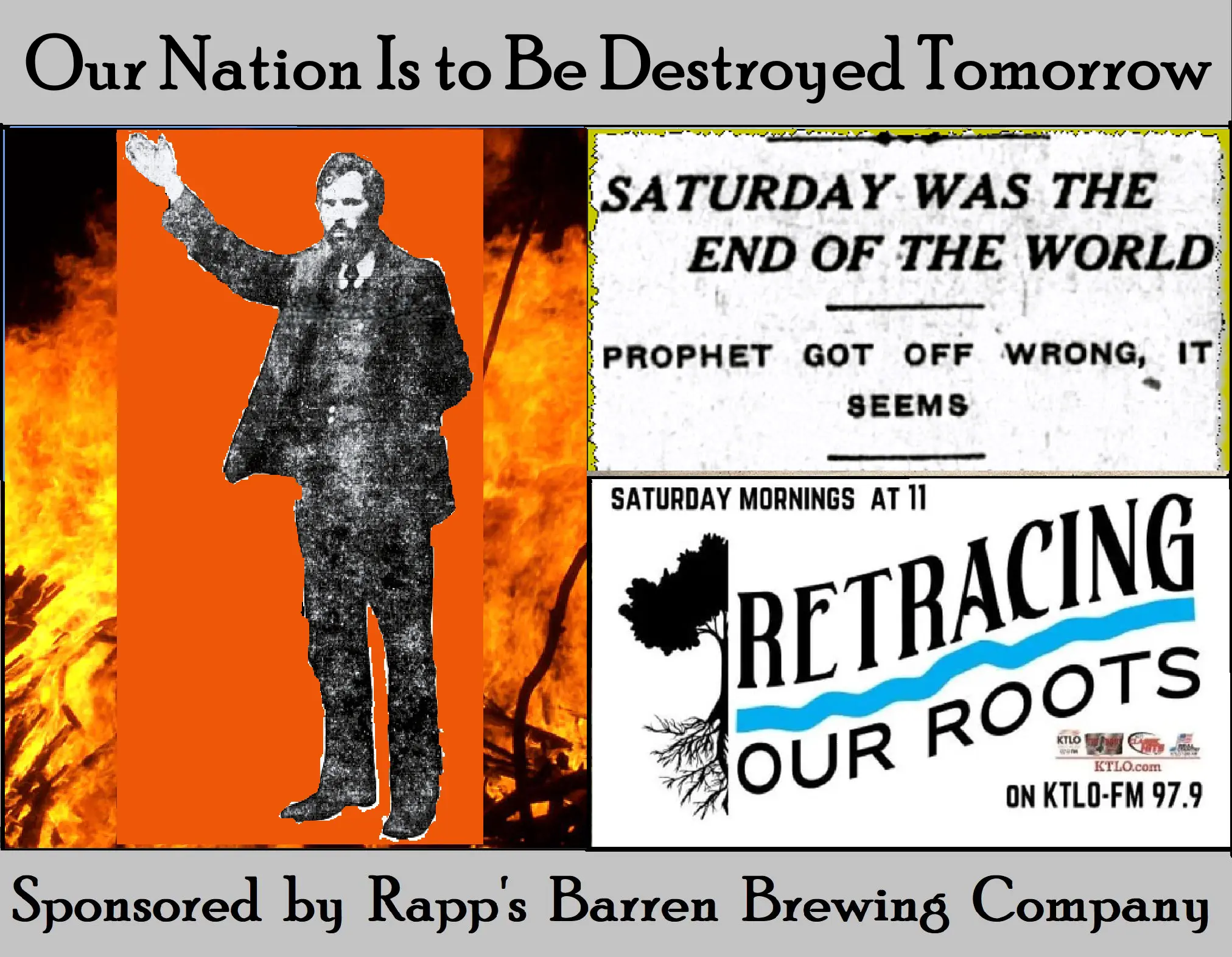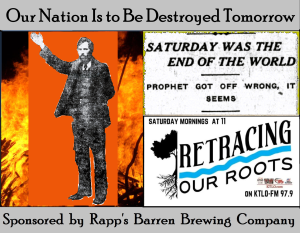
Our Nation Is to Be Destroyed Tomorrow
Welcome to 𝙍𝙚𝙩𝙧𝙖𝙘𝙞𝙣𝙜 𝙊𝙪𝙧 𝙍𝙤𝙤𝙩𝙨 as Sammy Raycraft and Vincent S. Anderson take you on a journey through Ozark religion. We will discover the glorious, the unusual, the tragic, and at times, the humorous tales rooted in Baxter County, Arkansas. We begin with a glimpse of revival and the lasting effects of the Second Great Awakening on Rapp’s Barren, just outside of Mountain Home. From there, hold on for the rollercoaster story of a self-appointed prophet who claimed he was chosen by God to proclaim the end of the world.
2nd Great Awakening in Baxter County
First, we’ll take a look at the early history of Baxter County from historian, Dr. Jason Fritz Norman, who once lived in Mountain Home, and passed away as a respected doctor and historian living in Springfield, Missouri.
We will read from an article published first in a handwritten letter and later published in the Springfield Newsleader January 11th, 1936.
“It seems that religious devotion was much more active in my early childhood days than it is at the present time. There was scarcely any crime except a little horse stealing. No such things as holdups robberies or crimes of that kind. No suicides to speak of. I'm thinking of the old Campground located about 4 miles Northwest of Mountain Home about 4 miles South of Highway #5.
The ground covered a few acres in the center of which is situated the arbor or the Tabernacle where all services were held. It was a large open shed of rather crude structure made of hewn timbers and roughed with shingles or fashion clappers. It was permanently constructed and was used for several consecutive years. The years 1855 to 1860.
Although these were the first five years of my life, I recall attending many of them. The cabins in which the people camped were strewn about the arbor, but in regular order, with pathways between them. They were constructed of crude logs cut from the forest permanently built and like. The arbor was used about 3 weeks out of the year. I will remember my father's cabin was a couple rooms, set a little ways apart, and a roof covered both of them. And the space between them with straw for carpet. They generally had three services each day: morning, afternoon, and evening.
Evening Services lasted well into the night, and often after services were over, you could hear folks singing and praying and shouting in their cabins. These services were of the most interesting character and much good was accomplished. The poor old pioneers, who were the leaders of the enterprise, worked under many disadvantages.
Most everybody had stock which existed in the Commons. They would kill a beef and use the flesh for food make shoes of its hide, and light the church with candles made of its tallow. This was even before the days of coal oil lamps, and mother took her big tin trumpet to the campground which they used to call the people together for services in the absence of a bell.”
The Prophet of the End of the World from Norfork
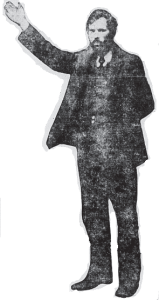
At thirty-five years of age, he was no ordinary fellow. Samuel “Sam” Wilhite reviewed his life while talking with a reporter in New York City in August of 1907, and Sam was long way from home in Baxter County, Arkansas. He sat in the First Avenue Municipal Lodging House, a charity house. Sam was interviewed with his boots cocked up on the table, pine bench tilted against the wall, spitting tobacco juice into a bucket with unerring aim. He had nothing left but eleven dollars in his pocket, a weary wife, five small children, and an unshakable conviction that he had been entrusted with the breaking of the seals of Revelation.
But Sam’s story began years earlier. Born in Tennessee and later settled in the Ozarks, he worked as a farmer, a preacher, and a small-town merchant. His preaching was fiery enough that his neighbors in Baxter County once gave him what they called “the voice to preach,” encouraging him though never formally ordaining him. Yet he had bigger visions than the local pulpit.
While traveling on foot to Fort Smith, Arkansas, he claimed a white and gray horse appeared providentially in a field by the roadside. According to Sam, the spirit of God moved so powerfully that the owner of the horse saddled it himself and gave it into his keeping. His great “cloud of witnesses’ was the condemning jury, and the authorities, however, called it horse stealing. For that, Willhite was sentenced to jail. But Sam did not see it as punishment. He declared his prison time a divine penance, the way he “won his crown” as the rider on the white horse spoken of in Revelation chapter six.
After prison, Sam and his family moved to Hopewell in Baxter County, Arkansas, and he farmed a little, merchandised a little, and preached wherever he could. But in June of 1907, while plowing in his Arkansas field, he said the Spirit spoke to him: “In ninety days shall the unexpected come to pass. Go thou among the accursed; say unto them that destruction is near. Let them prepare.”
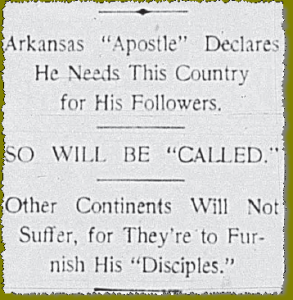
So, Sam sold his farm for four hundred dollars to Sarah Bodenhamer, and he gave away his possessions and merchandise at what he called “give-away prices,” and he set out to warn the world. With his wife and children in tow, he traveled to London, England. For three days he tried to preach in the streets, but the British authorities silenced him and ordered him out. He declared, “London does not want to be saved.” With only eleven dollars left, the Willhite family returned to the United States, arriving in Boston and then New York City.
There, newspapers marveled at the strange Arkansas prophet who claimed the nation would be destroyed on August 31, 1907. When the date passed without calamity, he recalculated and declared the end would surely come the following Thursday. Once again, the sun rose, the world went about its business, and the prophet of Baxter County was left embarrassed but still confident. “If it does not happen,” he admitted with a flicker of humor, “Spects I’d consider myself doggoned well fooled.”
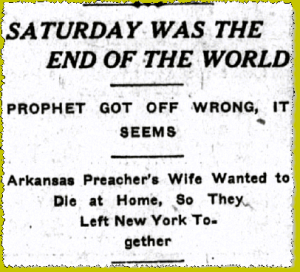
Mrs. Wilhite, Sam’s wife, continually expressed her desire to “quit gallivanting” and to go back home!
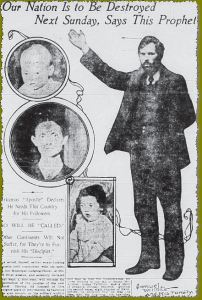
Back in Baxter County, the matter was not so humorous. Sam had given up his homestead patent for only twenty-five dollars as a down payment, warning Mrs. Bodenhamer that it would burn within forty days. When the world did not end, he tried to reclaim his farm in one of the strangest contests ever heard in the Harrison Land Office.
But the authorities also turned their attention to Sam’s mind. Upon his return, county officials had him examined by doctors. They judged him insane, and it was discovered that he carried several bullets lodged in his head from an old injury. The heat of summer, doctors noted, seemed to worsen his condition. Because of his instability, the court appointed his wife as his legal custodian, leaving her to care not only for their five children but also for her husband, the self-styled prophet who had staked everything on a vision that failed to come true.
Yet, against all odds, Sam later won his land case at the Harrison office, though Washington would have the final say. Through it all, his faith in his mission never wavered. He declared that three of the seals of Revelation had been revealed to him, and that he was in the process of breaking the fourth. He insisted that he alone carried the keys of death and hell, chosen of God as a second Christ. His wife, however, weary from years of gallivanting across oceans and cities, said simply, “If the world is going to end, I would rather be home in Arkansas with the children.”
So ended the remarkable journey of Samuel Willhite, a Baxter County prophet, prisoner, preacher, pauper, patient, and dreamer. He left behind not converts nor a movement, but a story that traveled from the Cumberland Mountains to the Ozarks, from London’s streets to the newspapers of Los Angelos and New York City.
- - - -
𝗧𝗵𝗮𝗻𝗸 𝘆𝗼𝘂, 𝗥𝗮𝗽𝗽’𝘀 𝗕𝗮𝗿𝗿𝗲𝗻 𝗕𝗿𝗲𝘄𝗶𝗻𝗴 𝗖𝗼𝗺𝗽𝗮𝗻𝘆!
A big thank you to our friends at Rapp’s Barren Brewing Company, and congratulations on your recent 8-year Anniversary. Their ongoing support is what helps 𝙍𝙚𝙩𝙧𝙖𝙘𝙞𝙣𝙜 𝙊𝙪𝙧 𝙍𝙤𝙤𝙩𝙨 echo through the hills with the true stories of the Ozarks, stories you will not find in the average history book. It is partnerships like theirs that keep our heritage alive, one story at a time.
Next time you are in downtown Mountain Home, stop by Rapp’s and thank Russell Tucker and his incredible team. They are helping preserve local history with heart and hometown pride.
Sip. Savor. Sojourn.
𝙍𝙚𝙩𝙧𝙖𝙘𝙞𝙣𝙜 𝙊𝙪𝙧 𝙍𝙤𝙤𝙩𝙨











